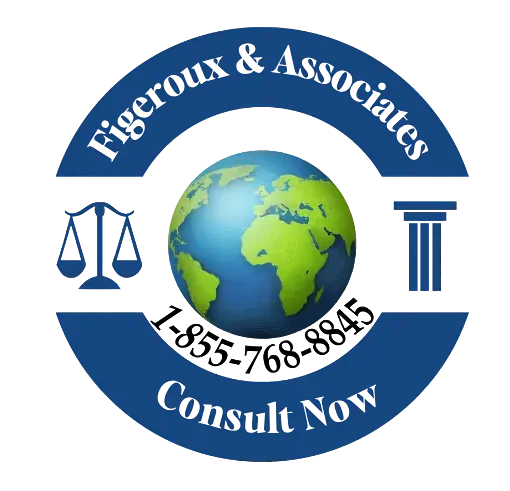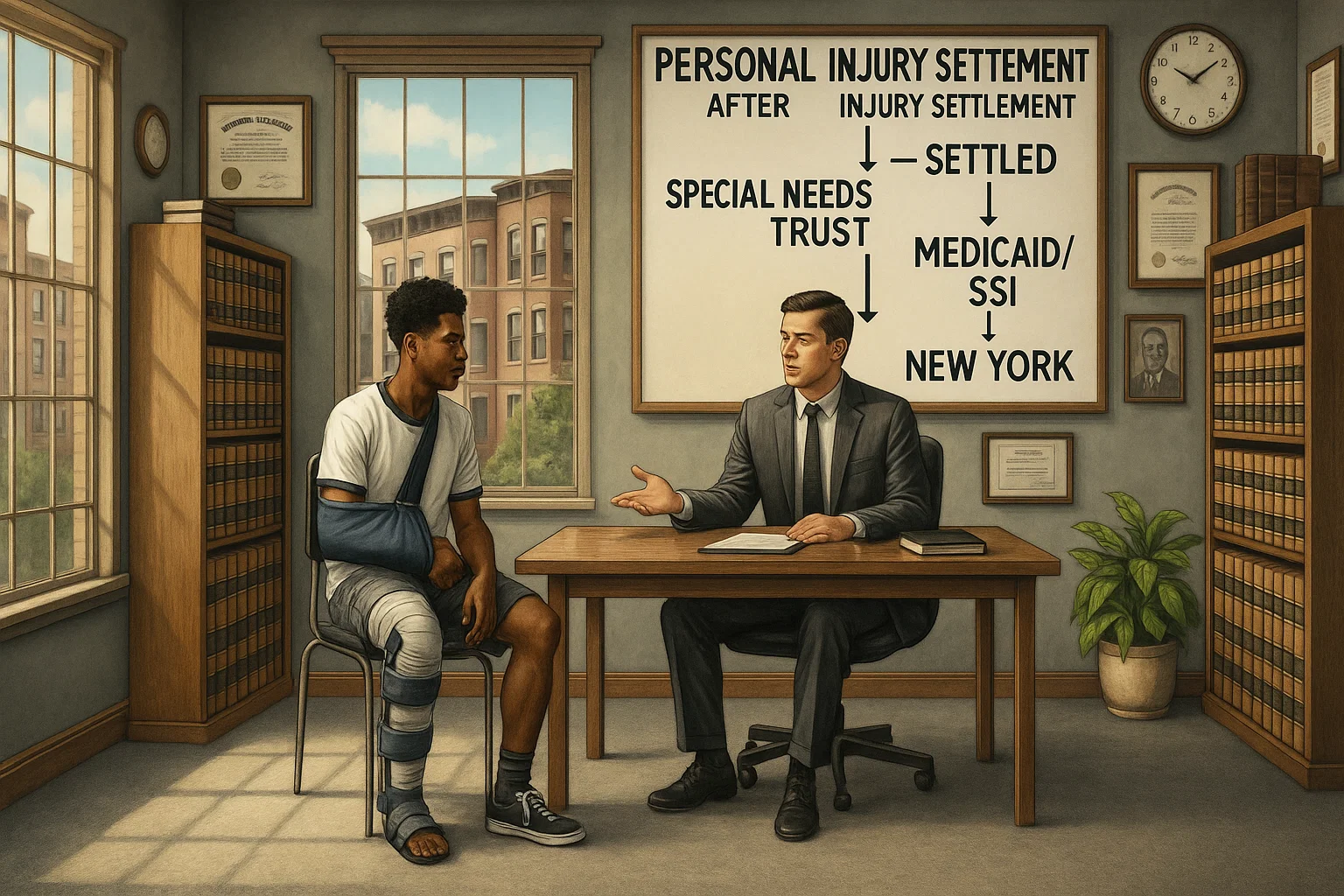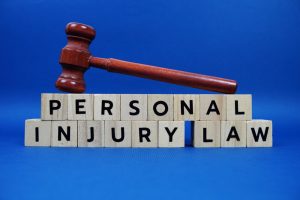Photo Copyright IQ INC.
Suffering a personal injury can be a life-altering event, bringing not only physical and emotional pain but also significant financial strain. While a personal injury award can provide much-needed compensation, it can also create an unexpected dilemma for individuals relying on essential public benefits in New York, such as Medicaid, Supplemental Security Income (SSI), or Supplemental Nutrition Assistance Program (SNAP). A lump sum settlement, if not managed carefully, can lead to the abrupt termination of critical aid, leaving recipients in a worse financial position than before.
At Figeroux and Associates, located at 26 Court Street, Suite 701, Brooklyn, New York, 11242, with website www.askthelawyer.us, and phone number 855-768-8845, we understand the intricate interplay between personal injury law and public benefits. This article provides a step-by-step guide on how to structure personal injury awards to prevent interference with public benefits in New York, highlighting the challenges, effective strategies, and the paramount importance of experienced legal counsel.
How a Personal Injury Award Can Affect Public Benefits
Many public benefits in New York are “means-tested,” meaning eligibility is determined by an individual’s income and resources (assets). When a personal injury award, especially a lump sum, is received, it can drastically alter these financial metrics, leading to a loss of benefits.
Here’s how different benefits can be affected:
- Supplemental Security Income (SSI): SSI is a federal program providing cash assistance to low-income individuals who are aged, blind, or disabled. It has strict income and resource limits. For 2025, the federal SSI resource limit is $2,000 for an individual and $3,000 for a couple. A personal injury settlement received as a lump sum immediately counts as a resource. If the award pushes the recipient over these limits, SSI benefits will likely be terminated. For example, if an SSI recipient receives a $50,000 settlement for a slip and fall injury, they would instantly exceed the $2,000 resource limit, losing their SSI benefits.
- Medicaid: Medicaid is a joint federal and state program that provides healthcare coverage for low-income individuals. Similar to SSI, Medicaid has income and resource limits. For 2025, the Medicaid resource limit for an individual in New York is $32,396. If a personal injury award causes a recipient’s resources to exceed this threshold, they risk losing their Medicaid coverage, which could be catastrophic for someone with ongoing medical needs from their injury or other conditions. For instance, a recipient of Medicaid who receives a $40,000 car accident settlement would lose their eligibility if the funds are deposited into a regular bank account.
- SNAP (Supplemental Nutrition Assistance Program): Formerly known as food stamps, SNAP also has income and resource limits, though they are generally higher than SSI and Medicaid. For a household of one with a dependent in New York in 2025, the SNAP income limit is approximately $2,510 per month. A large personal injury award, particularly if it generates interest income, could push a recipient over these limits.
- Temporary Assistance (Cash Assistance/Public Assistance): New York’s Temporary Assistance program provides cash benefits to needy families and individuals. This program also has strict income and resource limits. A significant personal injury award would likely disqualify a recipient from these benefits.
- Social Security Disability Insurance (SSDI): Unlike SSI, SSDI is an “earned benefit” based on an individual’s work history and contributions to Social Security. Therefore, a personal injury settlement generally does not affect SSDI benefits, as eligibility is not means-tested. However, SSDI recipients often also receive Medicare, which is not affected by a settlement, but they may also concurrently receive Medicaid or SSI if their income and resources are low, which would be affected.
Furthermore, it’s critical to note that the New York State Office of the Medicaid Inspector General (OMIG) has the right to recover Medicaid payments made for injury-related care from a personal injury settlement. This is known as a Medicaid lien. The entire amount of a personal injury settlement, not just the portion allocated to past medical expenses, is available to satisfy this lien. For example, if Medicaid paid $15,000 for your accident-related hospital bills and therapies, OMIG would typically place a lien on your settlement for that amount.
Strategies to Manage the Challenges
The good news is that there are established legal strategies to protect a personal injury award while preserving public benefits. The key is to prevent the settlement funds from being considered “countable” income or resources.
- Special Needs Trusts (SNTs) / Supplemental Needs Trusts (SNTs): This is the most common and effective strategy. An SNT is a specialized trust designed to hold assets for a person with a disability without jeopardizing their eligibility for means-tested government benefits.
- First-Party SNT: This type of SNT is funded with the assets of the injured individual (e.g., their personal injury settlement). To comply with Medicaid and SSI rules, the trust must be established for the benefit of a disabled individual under age 65, and it must contain a “payback” provision. This means that upon the beneficiary’s death, any remaining funds in the trust, up to the amount of Medicaid benefits paid on their behalf, must be repaid to the state Medicaid program.
- Example: A 30-year-old seriously injured in a car accident receives a $200,000 settlement. If these funds are placed directly into a First-Party SNT, managed by a chosen trustee (e.g., a family member, a professional trustee, or a non-profit organization), the $200,000 will not count as a countable resource for SSI or Medicaid. The trustee can then use the trust funds to pay for supplemental needs not covered by public benefits, such as specialized equipment, personal care attendants beyond what Medicaid provides, recreational activities, education, or home modifications (e.g., installing a wheelchair ramp).
- Pooled Income Trusts (PITs) / Pooled Supplemental Needs Trusts: These are a specific type of SNT administered by a non-profit organization. Individuals of any age (including those over 65) can transfer their excess income or resources into a pooled trust to maintain Medicaid eligibility. A key advantage for personal injury settlements is that funds in a pooled trust are typically not subject to the Medicaid payback provision upon the beneficiary’s death (though specific rules apply to income vs. resource contributions).
- Example: An individual receiving Medicaid community-based care, with a monthly income that exceeds the Medicaid limit ($1,800/month for an individual in 2025), receives a small personal injury settlement of $15,000. While a First-Party SNT could be used, for smaller amounts or for those over 65, a Pooled Trust might be more appropriate. The $15,000 can be deposited into a sub-account within the pooled trust. The non-profit trustee manages the funds, ensuring they are used for the beneficiary’s supplemental needs.
- First-Party SNT: This type of SNT is funded with the assets of the injured individual (e.g., their personal injury settlement). To comply with Medicaid and SSI rules, the trust must be established for the benefit of a disabled individual under age 65, and it must contain a “payback” provision. This means that upon the beneficiary’s death, any remaining funds in the trust, up to the amount of Medicaid benefits paid on their behalf, must be repaid to the state Medicaid program.
- Structured Settlements: Instead of a lump sum, a personal injury award can be received as a structured settlement, providing periodic payments over time.
- Example: A recipient of SSI is awarded $100,000. Instead of receiving it as a lump sum, they might agree to receive $1,000 per month for 100 months. If the monthly payments are structured to be below the income limit for their specific benefits, they may avoid disqualification. However, this strategy requires careful calculation and consideration of other income sources, as any monthly payment that still pushes them over the income limit could lead to benefit reduction or termination. Importantly, even with a structured settlement, any accumulated funds in the bank exceeding resource limits would still cause issues. A structured settlement can also be combined with an SNT to protect the periodic payments.
The Importance of an Experienced Personal Injury Lawyer
Navigating the complexities of personal injury claims while simultaneously protecting public benefits is a specialized area of law. Relying on an experienced personal injury lawyer, especially one with a strong understanding of elder law and special needs planning, is absolutely critical. Here’s why:
- Understanding Benefit Rules and Limits: Public benefit rules are constantly changing and vary by program. As of January 2025, Medicaid income limits are $1,800 for an individual and resource limits are $32,396. SSI resource limits remain $2,000 for an individual. An experienced attorney stays current with these figures and understands how various benefits interact.
- Preventing Disqualification: A knowledgeable attorney will advise you on the best way to receive and structure your settlement to prevent an immediate loss of benefits. They will ensure that the trust is properly drafted and funded according to New York and federal regulations.
- Avoiding Medicaid Liens: While Medicaid has a right to recover payments, an attorney can negotiate with OMIG to potentially reduce the lien amount based on the specifics of the case and the severity of injuries.
- Drafting and Funding SNTs: Establishing a compliant SNT is a highly technical process. Errors in drafting or funding can lead to significant penalties, including the loss of benefits. Your attorney will ensure the trust is legally sound and that all assets are properly transferred. They will guide you on permissible distributions from the trust to avoid jeopardizing benefits. For example, direct cash distributions to the beneficiary for food and shelter generally violate SSI rules, but the trust can pay for services like rent directly to a landlord or for specialized medical equipment.
- Tax Implications: Personal injury settlements are generally tax-free, but how they are managed in a trust can have tax implications. An attorney can advise on these aspects.
- Future Planning: An experienced attorney will consider your long-term needs, including potential future medical expenses, housing, and ongoing care, to ensure the settlement provides lasting security without compromising essential benefits.
- Advocacy and Negotiation: Your lawyer will advocate on your behalf throughout the personal injury claim process and, crucially, during discussions about your benefits, ensuring your rights are protected and your best interests are served.
Step-by-Step Process with Legal Guidance
- Initial Consultation and Assessment: Your attorney will conduct a thorough review of your personal injury claim and your current public benefit status (SSI, Medicaid, SNAP, Temporary Assistance, etc.). They will assess the potential size of the award and how it might impact each benefit.
- Strategic Planning: Based on the assessment, your attorney will develop a tailored strategy. This might involve recommending a Special Needs Trust (First-Party or Pooled) and/or a structured settlement. They will explain the pros and cons of each option in your specific situation.
- Negotiating the Settlement: During personal injury settlement negotiations, your attorney will ensure that the terms of the award align with the chosen strategy for preserving benefits. They will also address any existing Medicaid liens.
- Establishing and Funding the Trust: If a trust is recommended, your attorney will draft the specialized trust document. This involves meticulous detail to ensure compliance with all federal and New York state laws, including the necessary “payback” provisions for First-Party SNTs. Once the trust is established, they will guide you through the process of transferring the settlement funds directly into the trust.
- Trustee Selection and Guidance: Your attorney will advise on the selection of a suitable trustee (who cannot be the beneficiary themselves) and provide guidance on the trustee’s fiduciary duties and permissible expenditures from the trust to ensure continued benefit eligibility.
- Ongoing Review and Compliance: Public benefit laws can change. Your attorney can provide ongoing advice or refer you to an elder law attorney for periodic reviews of the trust and your benefit eligibility to ensure continued compliance.
Conclusion
Receiving a personal injury award can be a turning point, offering a chance for recovery and improved quality of life. However, without careful planning, it can inadvertently jeopardize essential public benefits. In New York, understanding how these awards intersect with programs like SSI and Medicaid, and employing strategies such as Special Needs Trusts or structured settlements, is paramount.
The intricate legal requirements for protecting these awards necessitate the guidance of an experienced personal injury attorney. At Figeroux and Associates, our dedicated team is adept at navigating these complex issues, ensuring your personal injury award enhances your life without compromising the vital support you receive. Don’t risk losing your benefits. Contact us today at 855-768-8845 or visit www.askthelawyer.us for a consultation to protect your future.
Click Here to Schedule a Consultation with Figeroux & Associates Today!



